Share

Howl in the Wilderness
Deep and insightful conversations with renegade artists, philosophers, psychologists and spiritual teachers who are working on the edge of dominant culture.
Latest episode
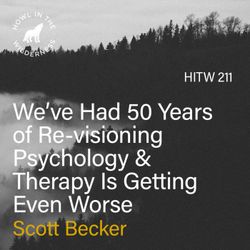
211. We’ve Had 50 Years of Re-visioning Psychology & Therapy is Getting Even Worse (RVP50) | Scott Becker | HITW 211
02:37:49||Ep. 211In celebration of the 50th anniversary of James Hillman’s magnum opus Re-visioning Psychology, we’re hosting a series of conversations with depth psychologists from diverse backgrounds and broad scope of practice who have been profoundly influenced by the work of James Hillman.Howling with psychologist and writer Scott H. Becker about how James Hillman’s ideas can help us navigate our current crises with greater compassion and creativity, and what it means for GenXers like us to carry the blue fire of archetypal psychology into the future.Support the podcast on Patreon: http://patreon.com/howlinthewildernessDepth Counseling with Brian James: http://brianjames.caArchetypal Men’s Coaching Program: http://brianjames.ca/fourinitiationsFollow me on Instagram: http://instagram.com/brianjames.soulworkHITW YouTube channel: http://youtube.com/@howlinthewildernessSend a donation via PayPal: http://paypal.me/brianjamessoulScott Becker is a licensed clinical psychologist in private practice and has worked as a therapist, clinical supervisor, adjunct professor, and administrator over the past 30 years at, among others, Notre Dame, the University of Oregon, the University of Rochester, and Michigan State University. He contributed the psychological commentary to the biography, The Life and Ideas of James Hillman, and has edited and introduced Volume 7 of the Uniform Edition of Hillman’s writings, Inhuman Relations. His research interests include grief and loss, complex trauma, multiculturalism, nondualism, couples and family therapy, environmental issues, astrology, and psychophysics. Interlude music by William Johnson, “While You Were Sleeping”https://www.youtube.com/watch?v=MyAxfxA09yQTags: james hillman, re-visioning psychology, archetypal psychology, politics, carl jung, depth psychology, imagination, creativity, podcast
More episodes
View all episodes
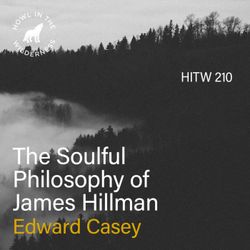
210. The Soulful Philosophy of James Hillman (RVP50) | Edward Casey | HITW 210
01:18:23||Ep. 210In celebration of the 50th anniversary of James Hillman’s magnum opus Re-visioning Psychology, we’re hosting a series of conversations with depth psychologists from diverse backgrounds and broad scope of practice who have been profoundly influenced by the work of James Hillman.Howling with writer, painter and philosopher Edward Casey about how his 40-year friendship with James Hillman led him to a philosophy that is rooted in the phenomenology of body, soul, imagination and place.Support the podcast on Patreon: http://patreon.com/howlinthewildernessDepth Counseling with Brian James: http://brianjames.caArchetypal Men’s Coaching Program: http://brianjames.ca/fourinitiationsFollow me on Instagram: http://instagram.com/brianjames.soulworkHITW YouTube channel: http://youtube.com/@howlinthewildernessSend a donation via PayPal: http://paypal.me/brianjamessoulProfessor Edward Casey, Distinguished Professor Emeritus of Philosophy at Stony Brook University, was the president of the American Philosophical Association (Eastern Division) from 2009-10, and he was chairman of the Philosophy Department at Stony Brook University for a decade. He works in aesthetics, philosophy of space and time, ethics, perception, and psychoanalytic theory. He obtained his doctorate at Northwestern University in 1967 and has taught at Yale University, the University of California at Santa Barbara, The New School for Social Research, Emory University, and several other institutions. He is currently Distinguished Professor of Philosophy at Stony Brook University.His recent research includes investigations into place and space; landscape painting and maps as modes of representation; ethics and the other; feeling and emotion; philosophy of perception (with special attention to the role of the glance); the nature of edges.https://escasey.comReferences:Gaston Louis Pierre Bachelard (elements)Gilles Deleuze and Félix Guattari (smooth / striated spaces)Megan Craig & Edward S. Casey, Thinking in TransitPhilosophical Intimations: Hillman, James, Casey, Edward S. CaseyImmanuel KantToward an Archetypal Imagination, Ed CaseyHenri BergsonAlfred North WhiteheadA Terrible Love of War, James HillmanMaurice Merleau-PontyPlants in Place by Edward S Casey, Michael MarderInterlude music by William Johnson, “While You Were Sleeping”https://www.youtube.com/watch?v=MyAxfxA09yQTags: james hillman, re-visioning psychology, archetypal psychology, politics, carl jung, depth psychology, imagination, creativity, podcast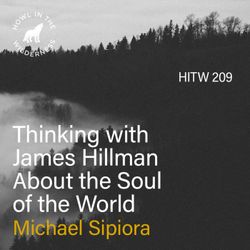
209. Thinking with James Hillman about the Soul of the World (RVP50) | Michael Sipiora | HITW 209
01:33:04||Ep. 209In celebration of the 50th anniversary of James Hillman’s magnum opus Re-visioning Psychology, we’re hosting a series of conversations with depth psychologists from diverse backgrounds and broad scope of practice who have been profoundly influenced by the work of James Hillman.Howling with writer, teacher and depth psychotherapist Michael Sipiora about Hillman’s legacy and how the ideas in Re-visioning Psychology are relevant to the most critical issues of our time.Support the podcast on Patreon: http://patreon.com/howlinthewildernessDepth Counseling with Brian James: http://brianjames.caArchetypal Men’s Coaching Program: http://brianjames.ca/fourinitiationsFollow me on Instagram: http://instagram.com/brianjames.soulworkHITW YouTube channel: http://youtube.com/@howlinthewildernessSend a donation via PayPal: http://paypal.me/brianjamessoulWriter, teacher and depth psychotherapist Michael P. Sipiora, PhD had an extensive academic career serving on the clinical psychology faculties of Duquesne University and Pacifica Graduate Institute. The author of numerous articles and book chapters in archetypal and phenomenological psychologies, he is also a licensed psychologist with a wide range of clinical experience in both private and community mental health settings. He currently practices psychotherapy and business consulting in Santa Barbara, California.https://www.psychologist-santa-barbara.comReferences:Psychological Citizenship and Democracy: The Political Relevance of Hillman’s Archetypal Psychology, Michael P. Sipiora (Spring Publications)Interlude music by William Johnson, “While You Were Sleeping”https://www.youtube.com/watch?v=MyAxfxA09yQTags: james hillman, re-visioning psychology, archetypal psychology, politics, carl jung, depth psychology, imagination, creativity, podcast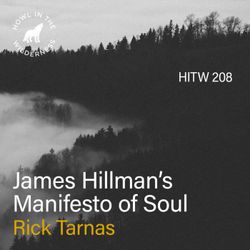
208. James Hillman’s Manifesto of Soul (RVP50) | Rick Tarnas | HITW 208
01:53:32||Ep. 208In celebration of the 50th anniversary of James Hillman’s magnum opus Re-visioning Psychology, we’re hosting a series of conversations with depth psychologists from diverse backgrounds and broad scope of practice who have been profoundly influenced by the work of James Hillman.Writer, teacher and archetypal astrologer Rick Tarnas discusses his 30 year relationship with James Hillman and the lasting impact of what Tarnas calls “Hillman’s Manifest of Soul” Re-visioning Psychology, published in 1975.Support the podcast on Patreon: http://patreon.com/howlinthewildernessDepth Counseling with Brian James: http://brianjames.caArchetypal Men’s Coaching Program: http://brianjames.ca/fourinitiationsFollow me on Instagram: http://instagram.com/brianjames.soulworkHITW YouTube channel: http://youtube.com/@howlinthewildernessSend a donation via PayPal: http://paypal.me/brianjamessoulRichard Tarnas, PhD, is Professor Emeritus at the California Institute of Integral Studies in San Francisco, where he was the founding director of the Philosophy, Cosmology, and Consciousness department. During his thirty years there he taught courses in the history of ideas, depth psychology, archetypal cosmology, cultural history, and the evolution of consciousness. He has also frequently lectured on archetypal studies and depth psychology at Pacifica Graduate Institute in Santa Barbara, and was formerly the director of programs and education at Esalen Institute in Big Sur. He is the author of The Passion of the Western Mind, a narrative history of the Western world view from the ancient Greek to the postmodern that is widely used in universities. His second book, Cosmos and Psyche, received the Book of the Year Prize from the Scientific and Medical Network. He is a past president of the International Transpersonal Association and was a long-time member of the Board of Governors for the C. G. Jung Institute of San Francisco.https://cosmosandpsyche.comReferences:James Hillman, Re-visioning Psychology (1975)J. Hillman, The Soul’s Code (1996)J. Hillman, On Senex Consciousness (Senex & Puer Uniform Edition #3)Interlude music by William Johnson, “While You Were Sleeping”https://www.youtube.com/watch?v=MyAxfxA09yQTags: james hillman, re-visioning psychology, archetypal psychology, animism, carl jung, depth psychology, imagination, creativity, astrology, podcast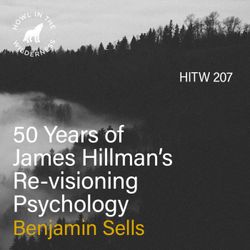
207. 50 Years of James Hillman’s Re-visioning Psychology (RVP50) | Benjamin Sells | HITW 207
01:31:32||Ep. 207In celebration of the 50th anniversary of James Hillman’s magnum opus Re-visioning Psychology, we’re hosting a series of conversations with depth psychologists from diverse backgrounds and broad scope of practice who have been profoundly influenced by the work of James Hillman.Writer and depth psychologist Ben Sells discusses the impact that Hillman’s ideas have had on his life and career over the past 50 years, and how they continue to inspire and inform his recent work on beauty, soul and aesthetic animism.* Support the podcast on Patreon: http://patreon.com/howlinthewilderness* Depth Counseling with Brian James: http://brianjames.ca* Archetypal Men’s Coaching Program: http://brianjames.ca/fourinitiations* Follow me on Instagram: http://instagram.com/brianjames.soulwork* HITW YouTube channel: http://youtube.com/@howlinthewilderness* Send a donation via PayPal: http://paypal.me/brianjamessoulBenjamin Sells is a writer, psychotherapist, lawyer, and former mayor of Riverside, Illinois. He is also a sailing captain and owner of Chicago’s oldest sailing school. He has written nine books, including The Soul of the Law, one of the most important work-life balance books in the history of the legal profession, that was recently reissued in a special 20th anniversary edition. His latest book is Love’s Desire: Beauty, Love, Soul, and the Search for the Meaningless Life. For many years he wrote a widely praised syndicated column on psychological issues in the legal profession and has published many articles and essays on psychology, history, and cultural affairs. His collaboration with famed psychologist James Hillman on America: A Conversation with James Hillman and Ben Sells was honored with a Gradiva Award from the National Association for the Advancement of Psychoanalysis. Sells has lectured extensively both in the United States and abroad and is a repeat lecturer at the prestigious Eranos Roundtable in Ascona, Switzerland. He lives in Riverside, Illinois.https://benjaminsells.comInterlude music by William Johnson, “While You Were Sleeping” https://www.youtube.com/watch?v=MyAxfxA09yQTags: james hillman, archetypal psychology, animism, imagination, creativity, podcast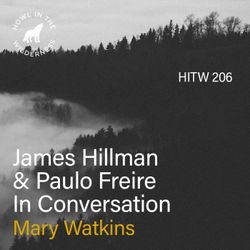
206. James Hillman & Paulo Freire In Conversation (RVP50) | Mary Watkins | HITW 206
01:29:36||Ep. 206In celebration of the 50th anniversary of James Hillman’s magnum opus Re-visioning Psychology, we’re hosting a series of conversations with depth psychologists from diverse backgrounds and broad scope of practice who have been profoundly influenced by the work of James Hillman.Mary discusses her “two intellectual fathers” James Hillman and Brazilian educator and philosopher Paulo Freire and how their work has informed her exploration of the intersections of archetypal psychology with social justice and community work.* Support the podcast on Patreon: http://patreon.com/howlinthewilderness* Depth Counseling with Brian James: http://brianjames.ca* Archetypal Men’s Coaching Program: http://brianjames.ca/fourinitiations* Follow me on Instagram: http://instagram.com/brianjames.soulwork* HITW YouTube channel: http://youtube.com/@howlinthewilderness* Send a donation via PayPal: http://paypal.me/brianjamessoulMary Watkins PhD is chair of the Depth Psychology Program, Co-Chair of the Community, Liberation, Indigenous, and Eco- Psychologies Specialization (CLIE), and Coordinator of Community and Ecological Fieldwork and Research in CLIE. She was trained as a clinical and developmental psychologist and was an early member of the archetypal/imaginal psychology movement. She has worked in a wide variety of clinical settings and with groups on issues of peace, diversity, social justice, reconciliation, immigration, and the envisioning of community and cultural transformation. Mary is the author of Waking Dreams, Invisible Guests: The Development of Imaginal Dialogues, Mutual Accompaniment and the Creation of the Commons, co-author of Toward Psychologies of Liberation, Talking with Young Children about Adoption, and Up Against the Wall: Re-Imagining the U.S.-Mexico Border, and co-editor of Psychology and the Promotion of Peace. Her new book is White Work and Reparative Geneology: Reckoning with Ancestral Debt as a Path to Racial Reparations.https://mary-watkins.netInterlude music by William Johnson, “While You Were Sleeping” https://www.youtube.com/watch?v=MyAxfxA09yQTags: james hillman, paulo freire, liberation psychology, archetypal psychology, imagination, social justice, podcast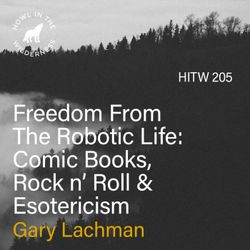
205. Freedom From the Robotic Life: Comic Books, Rock n’ Roll & Esotericism | Gary Lachman | HITW 205
01:32:06||Ep. 205Howling about comic books, punk rock and poetry in 1970s New York, Colin Wilson, esotericism and becoming who you really are with author Gary LachmanSupport the podcast on Patreon: http://patreon.com/howlinthewildernessDepth Counseling with Brian James: http://brianjames.caArchetypal Men’s Coaching Program: http://brianjames.ca/fourinitiationsFollow me on Instagram: http://instagram.com/brianjames.soulworkHITW YouTube channel: http://youtube.com/@howlinthewildernessSend a donation via PayPal: http://paypal.me/brianjamessoulGary Lachman is a prolific author and lecturer on consciousness, counterculture, and the Western esoteric tradition. His works include The Return of Holy Russia, Maurice Nicoll: Forgotten Teacher of the Fourth Way, and Dark Star Rising. A founding member of the rock band Blondie, he was inducted into the Rock and Roll Hall of Fame in2006. He lives in London. Interlude music by William Johnson, “While You Were Sleeping”https://www.youtube.com/watch?v=MyAxfxA09yQTags: james hillman, colin wilson, rock and roll, esotericism